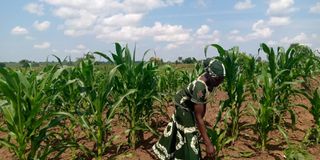Prime
Refugees decry high cost of renting land

One of the refugees in her garden at Bidibidi settlement in Yumbe District on Tuesday. PHOTO/ROBERT ELEMA
What you need to know:
They also complain that some landlords take back their land before the expiry date of the agreement
Refugees in Bidibidi refugee settlement in Yumbe District have decried the high cost of renting land from the host communities.
Reports indicate that the landlords charge exorbitant rates and claim back the land before the expiry dates.
The plots of land allocated for the refugees by the Office of the Prime Minister (OPM) that measures 30m by 30m has become small for practising agriculture and some refugees have resorted to renting pieces of land in the host community.
Speaking to Daily Monitor on Tuesday, Ms Joyce Akujo, the Refugee Welfare Council (RWC 3) chairperson for Zone II, said the cost of renting cause hunger and starvation.
“We used to rent a quarter piece of land ranging from Shs25,000 to Shs30,000 but this time, it has gone up to Shs60,000 for one year. Despite the high charges, some of the refugees rent the land but it’s sometimes absurd that the landlords reclaim the land back before exhausting the period they agreed on with the refugees,” Ms Akujo said.
She added: “Many refugees have fallen victims but if you want to be on a safer side, there should be an agreement signed by the landlord and the tenant on the land rented in the presence of the local council chairperson.”
Humanitarian organisations have been encouraging refugees to rent land for cultivation because of the increasing costs of living, cut in food supply and the money to help for upkeep.
Ms Suzi Tabu, a refugee, asked the Office of the Prime Minister and United Nations High Commissioner for Refugees to intervene.
“I rented land for two years. In the first year, I successfully harvested what I planted but in the second year, I planted cassava but the owner came and claimed back the land even before the expiry of the date,” she said.
The RWC 3 chairperson for Zone IV, Mr Moses Gala, said they are overwhelmed with issues of land conflicts.
“The rent fee of land was previously low but this time complaints are all over in the settlement. Once a refugee rents a piece of land, it is later taken away by the landlord before agreed time. This means some of the landlords do double deals by selling a piece of land two to three times to different people,” he said.
The Yumbe District chairperson, Mr Abdulmutwalib Asiku, asked the OPM and local government leaders to bridge the gap between the refugees and the host communities.
“It is dangerous for the refugees to go directly to negotiate with the landlords because you are negotiating with landlords whom you don’t know. At least there should be someone as a witness on the part of the government so that if there are issues of exploitation, the person can come in to regulate,” he said.
One of the landlords, Mr George Asiku, said: “The economic crisis is making some of my colleagues look for quick money. But this is going to create conflicts because these refugees also need money. There should be a clear agreement signed before one rents the land.”
The OPM Refugee Desk Officer for Arua, Mr Solomon Osakan, said land allocated to the refugees is fixed, adding that there is need for local leaders to assist them with land for cultivation.
“Some land has been offered to the refugees but they are far from where people are staying and this causes protection problems where the refugees sometimes claim they are being attacked and raped,” he said.




